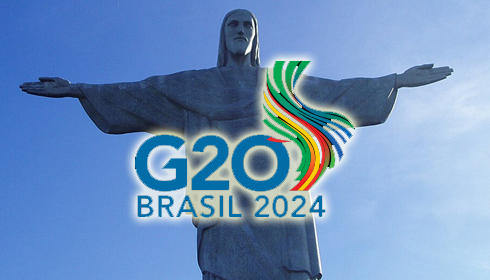
UN Secretary-General Issues Urgent Climate Appeal at G20 Summit
UN Secretary-General António Guterres issued a passionate call to action at the G20 Summit in Rio de Janeiro, asking member countries to solve the escalating climate problem. Highlighting the grave facts of global warming, he cautioned that "our climate is at a breaking point," emphasising the need to keep global temperature rise to 1.5 degrees Celsius to avoid disastrous repercussions.
Guterres stated, "Current policies would take us over three degrees." "That means catastrophe." He urged countries to expedite emissions reductions, aiming for a 9% annual decrease this decade. Despite worldwide agreements, emissions continue to climb, making the transition from fossil fuels to renewables crucial.
"The end of the fossil fuel age is inevitable," he added, stressing that renewable energy is currently the cheapest source of new electricity almost everywhere. However, Guterres underscored the need to prioritize justice in this transition, ensure the support of affected workers and communities, and diversify economies to sustain jobs and prosperity.
Reminding that the G20 nations have a big responsibility, given they account for 80% of global emissions, Guterres praised Brazil and the United Kingdom for their recent announcements of updated Nationally Determined Contributions (NDCs) and urged other G20 nations to align their climate action plans with the 1.5-degree target.
"Every country's new plans must include unambiguous, absolute emission reduction targets for 2030 and 2035," he stressed, advocating for sector-wide, all-encompassing measures to combat greenhouse gases. He detailed the global goals agreed upon at COP28, which include tripling renewable energy capacity, doubling energy efficiency, and ending deforestation by 2030.
Recognizing the growing threat of climate disinformation, Guterres announced the founding of the Global Initiative for Information Integrity in Climate Change, a collaboration between Brazil and UNESCO. The effort seeks to combat disinformation through more research and collaboration.
Guterres advocated for a new, ambitious climate financing objective ahead of COP29 in Baku, emphasizing the importance of concessional public funds for assisting developing countries. "Failure is not an option," he warned, warning that delays might undermine trust and stymie progress towards high-ambition climate plans for COP30 in Brazil.
As a case study, Guterres highlighted the preservation of the Amazon, a critical carbon sink. Guterres emphasized the importance of collaboration and accountability: "The success of COP29 is largely in your hands." I ask all countries around this table to take responsibility for its success."